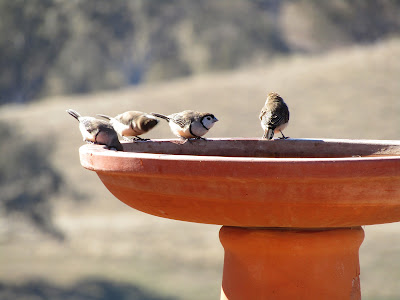Every day I see Double-barred Finches on my birdbath.
These little guys bounce, jump and hop about every where.
Heavy drinkers, they must have water views.
When other birds claim their drinking spot, they voice their displeasure from 2 metres away.
They don't mind sharing with other finches, it's bigger meat-eating birds they hate.
Waiting out the thirsty Cockatoos, Magpies and Kookaburras from a maze of nearby branches.
Their home is the native Wonga Vine that flowers through spring with creamy bell-like flowers.
They roost in this maze of foliage, making round sleeping nests to cram into at night.
Not big flyers, they bounce about, spending the hottest part of the day preening each other, offering each other another delicious 'feather-care' session in the sunset hour as well.
They live fast and die young. I worried they'd leave once the 3-year-drought finished and good rains came, but they didn't. They must get enough seeds from dry grasses, thistles and weeds, plus there are also plenty of insects about as well.
I'm glad they stayed, staking out their spot next to the bird bath a few feet from the house.
It's where they can drink as much as they need and bathe up to 20 times a day.
Always busy, they breed prolifically for eight months of each year.
This immature juvenile has indistinct black bars, is quite downy and hasn't quite developed clear spots on its wings yet.
Laying 4 or 5 eggs every 3 months, continually broods mean lots of finch fluff balls outside all through the warmer months of the year.
It's a quick turnaround with hatchlings leaving the nest after 3 weeks.
They many be tiny but they're also tough, sticking together for safety.
Looking sweet, lined up along the rim, the new fledglings bathe together.
Curious juveniles get used to me being in the garden, just as their parents did.
Then there's the high-pitched squeaking at the nest by little ones begging for food in all the daylight hours and then a couple afterwards.
I tried to record the fledglings scratchy, squeaking nest sounds.
When I move near the babes they immediately shut up; as if their parents told them to hush.
They chirp in a cranky way at bigger birds, goannas, snakes...
and human females with cameras pointed at them.
Delightful to watch, my favorite thing to see is these finches peering at their own reflections.
There are stacks of other names for Double-barred Finches:
Bicheno Finch of Black-ringed Finch
Black-rumped Double-bar or Banded Finch, Ringed Finch or Double-bar Finch
The best name is the Owl-faced Finch.
Whatever you call them the finches are incredibly sweet, welcome to stay as long as they like.
































❤
ReplyDeleteTa Steve.
Delete